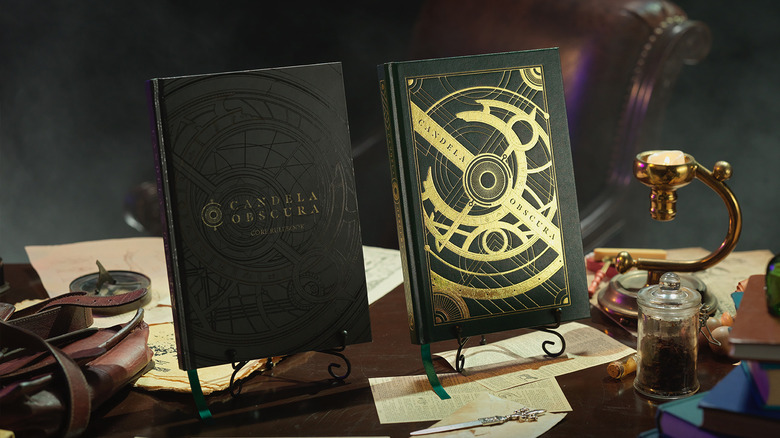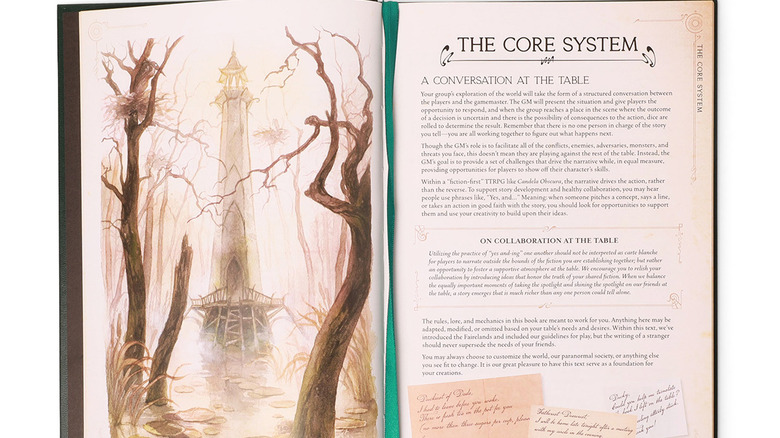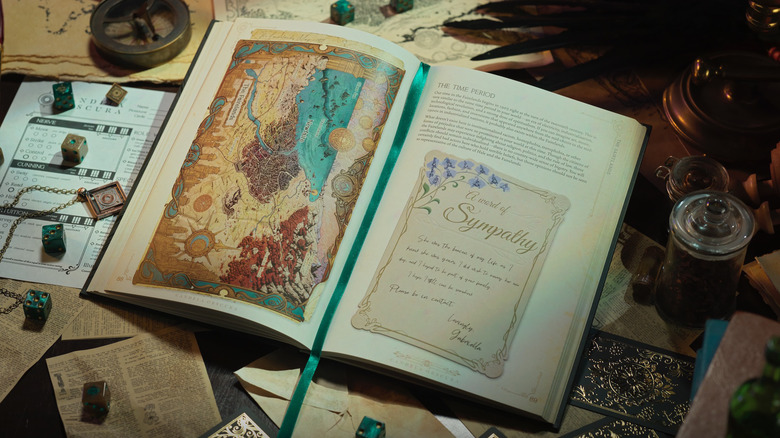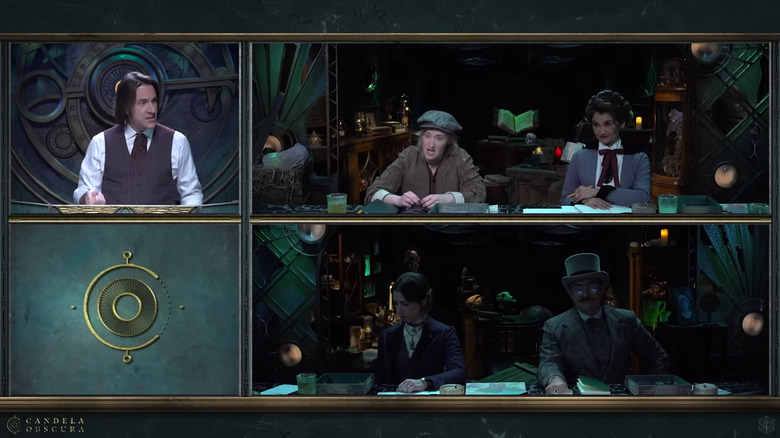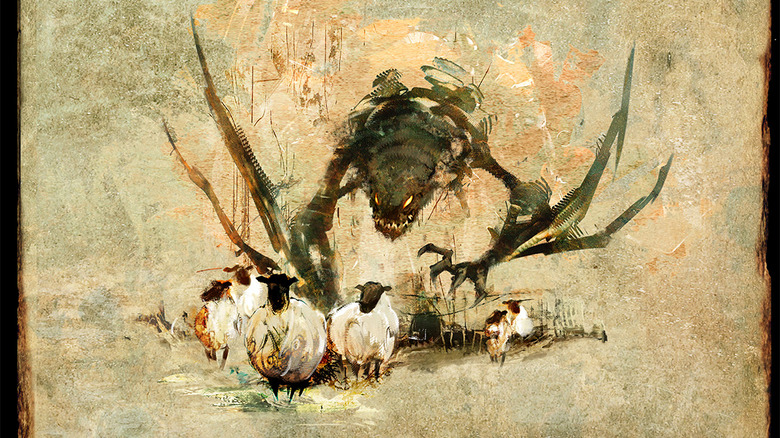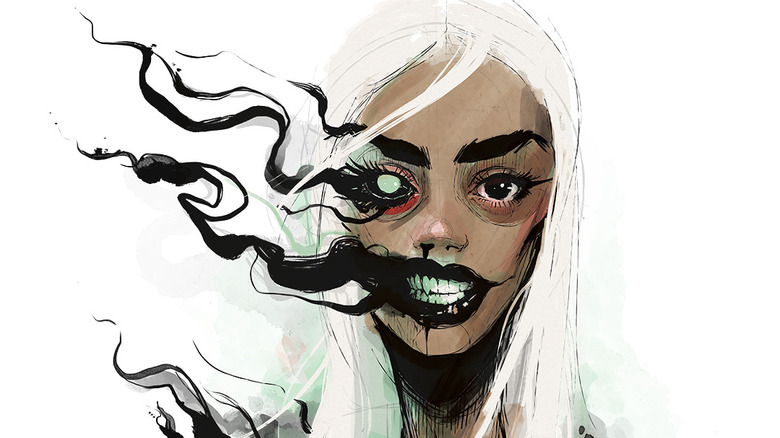Critical Role's Spenser Starke & Rowan Hall Reveal The Dark Origins Of Candela Obscura - Exclusive Interview
It's a good time to be a fan of tabletop role-playing games. No longer must friends accumulate in the basement solely to engage in "Dungeons & Dragons." Now, they have an entire collection of games at their disposal, regardless of what genre they're into. One of the newest to come onto the market is a horror TTRPG that takes some cues from H.P. Lovecraft and turn-of-the-century Americana: "Candela Obscura."
Following up "Queen by Midnight," designed by Kyle Shire, the newest game to come from the halls of "Critical Role" hails from lead writers and designers Spenser Starke and Rowan Hall. Within the game, players form a band of investigators to check out all kinds of potential eldritch terrors as well as one of the most haunting monsters the world has ever known — capitalism. The "Candela Obscura" rulebook may have over 200 pages of lore and mechanics to go through, but the game can be picked up by anyone who has a vested interest in delving into the darkest parts of society.
Looper had the chance to interview Starke and Hall about their new game and what went into it, including following some sage advice from their "Critical Role" cohorts. When it comes to exciting new TTRPGs, it's clear they've rolled a six.
Learning the ins and outs of Candela Obscura
Can you provide a little synopsis of "Candela Obscura" and where the idea of the story centered around a bunch of people investigating paranormal activities and the occult came from?
Spenser Starke: "Candela Obscura" is an investigative horror role-playing game, kind of like what you [Rowan] said about searching out, containing, and what is the other word we use?
Rowan Hall: Protecting humanity.
Starke: Protecting humanity from — Searching out, containing, and fighting off paranormal entities from beyond The Flare. It is a game about basically going out and hunting, but really learning —
Hall: Hunting for knowledge.
Starke: Right. It's hunting for knowledge, learning about what it is that these creatures from beyond The Flare, where they come from, what they want, and how we keep people safe from them. That was the premise that we came into with it. When I came onto the project originally, the idea had already been in place. It was a show that the production team wanted to do that Taliesin [Jaffe] was leading, and they were experimenting with a bunch of different ideas for what they could use, both system-wise and programming-wise. How were we going to do this show? What kind of format did it take, and what were we using to drive it?
There were a lot of things done at the wall, and they experimented with some different systems and things, and I was brought in to give my take on it. I was pulled off a different project and they were like, "What would you do with this?" I gave a pitch on what I would do with the show and what I do with the game, and I got the green light. We started working, and this was all in collaboration, of course, with the production team there, who are phenomenal, and were so supportive of the kind of thing that the whole creative team wanted to do. I sat down and started mapping out how we'd use the Illuminated Worlds System that was in developments from Stras [Acimovic] and Layla [Adelman], how we would use that as the basis, as the chassis for this game in particular.
From there, I knew that I needed another person to come on to help develop some of the myth and lore of the game, as well as have knowledge of mechanics so that I could bounce stuff around. Rowan is a mythologist. Rowan does a podcast called "Willing & Fable" that is all about history, mystery, and mythology. It was great, because we had met, and I had listened to a bunch of the podcast and loved how she and her podcast partner Tracey [Harrison] were able to take myths from all across the world and all across time and synthesize them, do a 20-page research paper, essentially, on them every week, and part of the podcast is then doing an original retelling, so contextualizing them in a new way that hasn't been seen before. Those were the building blocks of what we were trying to do here in some respect.
We were taking this idea of cosmic horror, gothic horror, and we were trying to build our own version of a mythology around that. I brought Rowan in originally for just a week to help develop ideas, and then two weeks, and then a month, and then she was on the project full time, and then became a co-designer on the project.
Hall: Now I work here full time. You can't get rid of me.
Spenser Starke and Rowan Hall's horror influences
Candela Obscura: It is a horror-themed TTRPG, so what are some of your favorite horror movies, either ones you really enjoy or if there are any that inspired the game?
Hall: Conveniently, we just played a "Ten Candles" game with a bunch of friends to celebrate Halloween. We all could not stop raving about M. Night Shyamalan, but [specifically] "Sixth Sense," "The Village."
Starke: Early M. Night, right? Any M. Night that was pre-"Lady in the Water," right?
Hall: Yes, and there's so much Mike Flanagan all over "Candela." He is so clearly — his entire team, because he works with this wonderful team, that's his way of tackling horror. I could not possibly quote this man exactly. He has talked about how he doesn't believe that ghosts are real, but they are a manifestation of what people are dealing with. That is such a wonderful roadmap for creating ghosts in any horror, especially when the ghosts then, on top of that, are real as they often are in "Candela."
Starke: I would say, in general, the Ari Aster world of horror. I also think of Mary Shelley as being a point of inspiration. "Candela" is a cosmic horror game in aesthetic, in flavor, but it is gothic horror in structure. These are not unknowable beings that you'll never be able to describe and that you can never face. These are beings that are horrific and that might be cosmic in their horror, but they are not unknowable because "Candela's" whole thing is knowing. In that way, you can face off against them.
We try to capture a wide breadth of horror styles in this. You can take it into that more straight-up cosmic horror route where these are nobodies who are facing off against the challenges they could never fathom. If you want to take it that route, you can, but you can also, in my latest chapter of "Candela" that I'm GMing for the channel, it's an action horror game with strong PTSD, war, all of the monsters have to do with the people, and they are manifestations of their fears. We tried to make it open enough that you can adapt to the kind of style you want to play in.
Hall: We would be remiss if we didn't point out the really obvious touchdowns like "Lovecraft Country," because any media that's coming out with eldritch horror is inherently in conversation with H.P. Lovecraft. That's something we talk a lot about. "In conversation with" is a big phrase for us because any media, especially genre media, is always having a conversation with anything that came before it.
I always think of fine art, like Cy Twombly, is in conversation with Picasso. Whether we like it or not, that happens. The exciting thing is a lot of people who were specifically excluded from H.P. Lovecraft in a violent way are claiming eldritch horror, and the way that Candela is in conversation with H.P. Lovecraft is really an argument. The conversation might end in fisticuffs.
Critical Role inspiring elements of Candela Obscura
If people want, and they should, they can watch playthroughs of "Candela Obscura" on the "Critical Role" social media channels. Was there anything they did or things they pursued in the story that amazed you, or did they do something that explored the world that maybe you didn't think of or consider? [Maybe] you're glad someone did this with what you created?
Hall: One of the cool things that happened very recently in Chapter 2 is when Marisha [Ray] and Travis [Willingham] came in. They sat down and they very clearly expressed from the get-go that they wanted to be in service of the stories of the guests that were coming on the channel, which is such a gift, and is such a wonderful precedent to set and made for an incredibly rich web that you all wove in Chapter 2. Everybody coming in and independently deciding they wanted to examine the fallout of the war was fascinating.
Starke: Everybody dove into the Last Great War. It was starting with Brennan [Lee Mulligan], who chose to be a soldier, and then from there, it cascaded that everybody else was related to the war in some way as well. One of the scariest, and also, most fascinating or fulfilling parts of shooting the last two seasons of the show was that we were still in development of the game while they were doing it. I was in the middle of writing with Rowan while I was filming my chapter.
Hall: I was typing, writing the book, and when there was a break, I would go, "I know you want a break. You can't have a break. I need to talk to you."
Starke: I come in and we talk about something and then when we wrapped for the night, we'd go to a Denny's and we'd keep going, and we'd take what we learned from the show that night and make sure that we're continually integrating. There's pieces from the show in the book that are there simply because I was in the middle of it as we were writing it.
Hall: Hats off to Matt Mercer, who went on even earlier when the book was even more in development and was asking questions that we didn't necessarily have answers to until he asked, and what a fearless act to go on. He was so kind to come in, and he put us at ease, because he believed that we could all do it together. He was so excited to play in this world that, even though it was still in development, it ended up being an exceedingly smooth process, even though we were handing him raw Google documents.
"Critical Role" had previously done another horror RPG, "Call of Cthulhu: Shadow at the Crystal Palace." Did that game have any influence on "Candela Obscura?"
Starke: Yeah. They were so excited to ... they had such a blast with that. I remember them talking about, even before the pandemic, they were like, "We should do another thing that's kind of like that, but we should have our own take on it." That got kicked around and, I would imagine, eventually became the framework for what they were doing previously in "Candela."
When I got pulled in, it was fairly divorced from "Shadow of the Crystal Palace," in that it wasn't a sequel to it. It was like, "We liked going on that kind of adventure. Let's see what other stuff in that space we can play with." The Lightkeeper from Chapter 1 of "Candela" was Alexandra Elise O'Neill, who was a character in that show. It was very much a nod to that of, yes, we understand the lineage of where we are coming from with this, but we are doing our own thing.
Overcoming challenges of fleshing out the lore to Candela Obscura
Were there any major challenges to designing the game, or were there any parts of developing the lore that you had to find creative workarounds to make everything work with each other?
Hall: One of my favorite challenges, in that it kept us up nights and there were times that we were writing until 2:00 AM and it was a pickle, is we decided very early on that if this game is a mystery game, then the book itself should present a mystery. We decided very early that we wanted the book to straddle this in-world and out-of-world space to exist in the Fairelands and also talk to the players.
Starke: Sort of in the same way that Taliesin does in the show. Taliesin is the Lightkeeper for the audience in the show, bringing them in to "Candela Obscura." In the same way, the book was straddling that space of being the reader's Lightkeeper.
Hall: There is a Lightkeeper for the book, and I don't know if you've ever read the "Dragonology" books. This is a deep cut if folks haven't read them. The books, they're so good, but you open them up and you can read, in-world, it's about dragons. You learn the history and the lore of dragons, but if you look at all the little bits and bobs in the corners, there's a story happening, and you don't miss anything if you don't interact with it that you need. If you do, it's so much richer.
From the get-go, we wanted to provide that for people. And I think even though it was one of the most difficult parts, it was the thing that we were so dedicated to. And I have a deep and devoted love for the people that exist in the margins of this book. And I think that so much of horror is losing what you love. And so putting these people in the margins was really important.
For me, personally, getting my friends to start a TTRPG, a big part of that is getting them to overcome the trepidation after seeing a big rule book. The core rule book here is about 200 pages. What would you say to anyone maybe on the fence about starting "Candela Obscura," or any game, to ease them into something that's going to have a lot of lore to it?
Hall: We always say that, ideally, you can know what the goal is in less than five minutes. You can know the rough idea of how to play in 30 minutes or less, and then you can reach an assistant master, an approximation thereof, in one session. Making this world just left or right of the real world allows people to not fear lore missteps. You don't have to read six pages to know about the religion in "Candela Obscura." Your GM just told you it's a rough approximation of Christianity with a gothic horror, Catholic kind of flavor. You're like, "I can work with that."
Starke: Right. Instead of the Father, Son, Holy Spirit, it's the Mother, Father, and Child. It's approximately the same, but it has a little bit of variance, but it doesn't really matter. It's the ascendancy. It's all you need to know. You can move forward.
Hall: You can say, "Father." You can put a nun in there, and it doesn't break everything. When players don't have to fear correction — it's not the little moments, it's like being too afraid to talk because you don't know what the different colors of dragons do, or any example. Hopefully, this game will free people up in that way.
What the future holds for Spenser Starke and Rowan Hall
Is there anything coming down the pipeline for the two of you that you can talk about, or is it time for a nice rest after working on this?
Starke: We are currently also on the Darrington side. We're in development on "Daggerheart," which is so exciting. Honestly, we are looking to see what players gravitate towards in the book that we made, so that we're able to give them what they want. We've poured our hearts and souls into the current book, and we're very excited to dive back in. Before we dive back in, we want to see how other people take the pieces that we've given them and start to expand and feel like, "I would love more of this," or "I wish that we had a different version of this," or these kinds of playbooks or whatever it is.
We're excited to see how people use it and then figure out the best way to support the community who is playing it after that. One of the things about the conversation is that once we release this book, we are in conversation with the GMs and the players who are playing. It's incredibly valuable for us to maintain that conversation, because ultimately the book means nothing if nobody's playing it. We have to be in conversation with them. We have to listen to what they want, because they are the ones who are using it. That is the whole purpose.
Hall: I'm so thrilled for it to be out because ... I won't speak for [Spenser]. I got to have the moment of people being enthusiastic about what I was enthusiastic about. When Brennan walked in and wanted to play a soldier and wanted to explore PTSD, I talked to him a bit about it, and I remember feeling like, "Thank God." I am so excited about this, and you never know if it's going to resonate with someone else. And as soon as Chapter 2 started, I was like, "This is a gift."
I feel so grateful. We've had a couple of moments where people came in and were enthusiastic about little things that we also were very enthusiastic about, and it's so kind. It feels like a distillation of the best part of TTRPGs, which is play. When people come in, they're like, "I saw what you did, and then I expanded on it." You're like, "Yes, we're in the game."
Starke: Our whole job is build the scaffolding and then let the GMs take that and run with it. We're excited to see what we do with that scaffolding.
"Candela Obscura" is available from Darrington Press starting November 14 with standard and limited edition hardcovers.
This interview has been edited for clarity.
